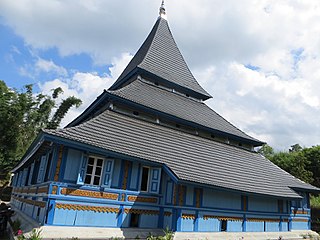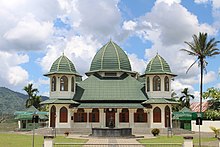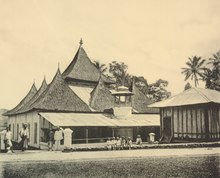
West Sumatra is a province of Indonesia. It is on the west coast of the island of Sumatra and includes the Mentawai Islands off that coast. West Sumatra borders the Indian Ocean to the west, as well as the provinces of North Sumatra to the north, Riau to the northeast, Jambi to the southeast, and Bengkulu to the south. The province has an area of 42,119.54 km2 (16,262.45 sq mi), or about the same size as Switzerland, with a population of 5,534,472 at the 2020 census. The official estimate at mid 2023 was 5,757,210. The province is subdivided into twelve regencies and seven cities. It has relatively more cities than other provinces outside Java, although several of them are relatively low in population compared with cities elsewhere in Indonesia. Padang is the province's capital and largest city.

Bukittinggi is the third largest city in West Sumatra, Indonesia, with a population of 111,312 in 2010 and 121,028 in 2020, and an official estimate as at mid 2023 of 124,047 - comprising 61,949 males and 62,098 females. It covers an area of 25.24 km2. It is located in the Minangkabau Highlands, 90 km by road from the West Sumatran capital city of Padang. The city is completely surrounded by the Agam Regency, making it an enclave within the regency, and it is located at 0°18′20″S100°22′9″E, near the volcanoes Mount Singgalang (inactive) and Mount Marapi. At 930 m above sea level, the city has a cool climate with temperatures between 16.1° to 24.9 °C.

Rumah Gadang or Rumah Bagonjong "house for the Minangkabau people" are the traditional homes of the Minangkabau in West Sumatra, Indonesia. The architecture, construction, internal and external decoration, and the functions of the house reflect the culture and values of the Minangkabau. A Rumah Gadang serves as a residence, a hall for family meetings, and for ceremonial activities. In the matrilineal Minangkabau society, the Rumah Gadang is owned by the women of the family who live there; ownership is passed from mother to daughter.

The architecture of Indonesia reflects the diversity of cultural, historical, and geographic influences that have shaped Indonesia as a whole. Invaders, colonizers, missionaries, merchants, and traders brought cultural changes that had a profound effect on building styles and techniques.

Sir Viqar ul-Umara, Iqtidar ul-Mulk, Iqbal ud-Dowla, Secundar Jung, Nawab Muhammad Fazl-ud-din Khan Bahadur, was the Prime Minister of Hyderabad State from 1893 to 1901, and also served as the Amir-e-Paigah from 1881 to 1902.

The Ganting Grand Mosque is a Sunni mosque located in Ganting, Padang, West Sumatra, Indonesia. Construction began in 1805, making it the oldest in Padang and one of the oldest in Indonesia. It is a Cultural Property of Indonesia.

Grand Mosque of West Sumatra is a mosque in Padang, West Sumatra, Indonesia. It is the largest mosque in West Sumatra and the second-largest mosque in Sumatra. It is located in Padang Utara Subdistrict, Padang, West Sumatra. The Grand Mosque of West Sumatra is located within a complex of 40,345 square meters at the intersection of Jalan Khatib Sulaiman and Jalan Ahmad Dahlan.
The Singapore Islamic Hub is a religious campus that houses Masjid Muhajirin, Madrasah Irsyad Zuhri Al-Islamiah and the headquarters of Majlis Ugama Islam Singapura (Muis). These institutions combined create a cohesive and symbiotic whole, embodies the Islamic principles of Iman, Ilmu and Amal respectively.

Rao Rao Mosque is one of the oldest mosques in Indonesia located in Nagari Rao Rao, Tarab River, Tanah Datar Regency, West Sumatra. It is located on the road from Batusangkar bound to Bukittinggi, precisely in Rao Rao. This mosque of Minangkabau and Persian architecture was built in 1908 with a roof made from fibers before being changed to zinc.

The Bingkudu Mosque is one of the oldest mosques in Indonesia. It was founded by the Padri in the wake of the Padri War in West Sumatra in 1823. This mosque with typical Minangkabau style architecture is located in Jorong Bingkudu, Nagari Canduang Koto Laweh, Canduang District, Agam Regency, West Sumatra. When it was first built, the building of the mosque was made of wood on its floor, pole, and wall.

Jami Mosque of Taluak is one of the oldest mosques in Indonesia, located in Taluak IV Suku Nagari, Banuhampu District, Agam Regency, West Sumatra. The location of the mosque is close to the border of Bukittinggi, thus it is also known as Jamik Taluak Mosque Bukittinggi.

Koto Baru Grand Mosque is one of the oldest mosques in Indonesia located in Koto Baru Nagari, Sungai Pagu District, South Solok Regency, West Sumatra.

Jamek Mosque, officially Sultan Abdul Samad Jamek Mosque is one of the oldest mosques in Kuala Lumpur, Malaysia. It is located at the confluence of the Klang and Gombak rivers and may be accessed via Jalan Tun Perak. The mosque was designed by British architect and soldier Arthur Benison Hubback, and built in 1909. It was the principal mosque of Kuala Lumpur until the construction of the national mosque Masjid Negara in 1965.

Mosque-Sabil of Sulayman Agha al-Silahdar or Mosque-Sabil-Kuttab of Sulayman Agha al-Silahdar is a complex of mosque, sabil and kuttab established during the era of Muhammad Ali Pasha in Islamic Cairo, the historic medieval district of Cairo, Egypt. It is located at the beginning of Burjouan alley of the famed Muizz Street. On the other side it faces the extension of Al-Nahasin Street leading to the Bab Al-Shaareya square.

The Tuo Koto Nan Ampek Mosque, also known as Gadang Balai Nan Duo Mosque is one of the oldest mosques in Indonesia located in Koto Nan Ampek Nagari, now administratively included into the area of Balai Nan Duo village, West Payakumbuh District, city of Payakumbuh, West Sumatera. The Minangkabau architecture is thought to have been built in 1840 which was originally covered with fiber roofs before being replaced with zinc. Currently, other than being used for Muslim worship activities, this single-level mosque is also used by the surrounding community as a means of religious education.

The Nurul Iman Mosque is a mosque located at the corner of Jalan Imam Bonjol and Jalan Muhammad Thamrin in Padang, Indonesia. The mosque was built by the Indonesian National Armed Forces and the national government, as a gesture of apology following a West Sumatran rebellion in 1960.

Grand Mosque of Kubang Putih is an early 19th-century mosque located in the town of Kubang Putiah, West Sumatra, Indonesia. The mosque is designated as a cultural heritage object along with several other old mosques in West Sumatra, such as Bingkudu Mosque in Agam, Rao Rao Mosque in Tanah Datar, and the Ganting Grand Mosque in Padang.

Minangkabau culture is the culture of the Minangkabau ethnic group in Indonesia, part of the Indonesian culture. This culture is one of the two major cultures in the Indonesian archipelago which is very prominent and influential.





























